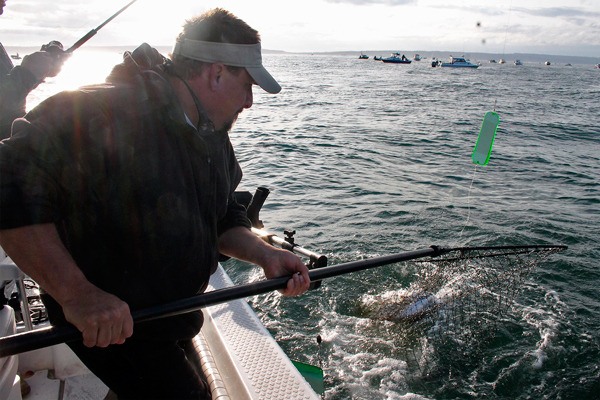The early bird gets the worm, and only the earliest of anglers can get the king.
A veritable fleet of small boats loaded with anxious anglers took to the waters between Coupeville and Port Townsend last week with the hope of hooking into the most regally named sport fish in Puget Sound, the king salmon.
Also called chinook, the king season is short and sweet. Opening day in Marine Area 9, the west side of Whidbey Island, was July 16. The season was slated to last until Aug. 15 but is coming to a premature close at the end of the day Sunday when the Washington Department of Fish and Wildlife expects the catch quota in that area of 2,483 fish to be met.
As of Thursday, anglers had harvested an estimated 1,953 kings in Marine Area 9.
The short season means that opening day is often frantic and this year was no exception.
On a Triumph fishing boat with a few South Whidbey die-hard king salmon anglers July 16, the day started while the rest of Whidbey seemingly slept. Wake up was at 3:20 a.m., and the drive from the Maxwelton Valley to Bush Point and Lagoon Point saw only two other pairs of headlights, both heading south and away from the buzz of king salmon action.
The boat launched by 4:45 a.m. and the first lines set up with the downrigger by 5:15 a.m. Then came the waiting.
Fishing for kings is a game of patience and persistence, said boat owner Jean Streitler of Clinton, who was accompanied by friends Don Heggenes and Tom Fallon. There are no tricks, they said, to catching kings. It’s about time and action.
“Be fishing,” Streitler said.
Added Fallon: “You can’t catch anything sitting on the couch or in bed.”
Alas, salmon proved to be both elusive and feisty, but the day wasn’t without excitement. Lures run deep, about 120 feet, and as Fallon reeled in the squid-like lure — a strike! Turning over the level wind reel and bringing in the fish, it was hardly a loss to Fallon to watch the pink salmon spit out the hook and swim away a dozen or so feet from the boat.
“Stupid humpy,” Fallon said.
As the hours wore on and daylight breached through a cloudy sky and shone across the mountains, the tension that perhaps the only fish to be hooked had gotten away grew.
Across the water, what started as a faint line of flickering boat lights in the dark became an increasingly frenzied horde of fiberglass and aluminum boats trolling south. Like a choreographed dance, the vessels drifted from Marrowstone Island toward Port Townsend, then motored back to repeat the motion.
While the South Whidbey men said previous years were far busier, the area was choked with boats. With so many on the water, the lack of hearing “hoots and hollers” was both encouraging and disheartening because it meant their boat wasn’t the only one not finding fish.
More waiting.
By 6 a.m. Heggenes’ rod jumps up off the downrigger. Fish on.
Heggenes yanks up, setting the hook. He pulls up and reels in as he lets the rod down. He repeats the motion a dozen more times before a silver flash thrashes in the water, 10 yards from the boat. He reels it close enough for Streitler to scoop it into the net for a quick boat-side inspection — a big, 20-pound, native chinook that must be released.
“It’s thrilling to reel it, but it’s even more thrilling to hold it,” Heggenes said.
Another 80 minutes pass before either rod sees that kind of action. In the meantime, tales are told, theories of why the fish aren’t biting and where they may be are shared, and several more passes along the stretch of water are made.
Then, out of the deep blue sea, the rod jumps up as it releases from the downrigger again. Heggenes begins to reel, this time with far less fight, and hauls it alongside the boat. With its adipose fin clipped, it was a hatchery king and a keeper, estimated at 12 pounds. Tossed into the boat’s stowage bin for cooling and keeping, at least one fish was landed.
It ended up being the only fish kept before being dropped off at Bush Point to haul out the boat for another day. Later in the afternoon, a local fishing expert said he’d heard only one report of a successful king salmon trip. Bob Crouch, the resident fishing expert at Sebo’s Do-It Center in Bayview, said a man came by in the late morning and reported he had kept 20-pound and 16-pound king salmon, meeting his daily legal limit.
“That’s the only one I’ve heard of so far, but they’re big fish,” Crouch said.
“It sounds like it’s starting off good,” he added.
King salmon fishing, because of the depth at which they typically swim and feed, is largely relegated to boaters. That limits some access, especially as opposed to the nearshore catchability of pink salmon at beaches such Bush Point, Mutiny Bay and the Keystone spit in Coupeville. But every once in a while, someone hooks into a king from the beach, as Crouch said he can attest to. Both times the catch was out of season and he released them.
At least one Oak Harbor angler landed a king from the shore at Driftwood Park this month, but it’s rare.
“I’ve caught them off the beach,” Crouch said. “They happen occasionally.”



